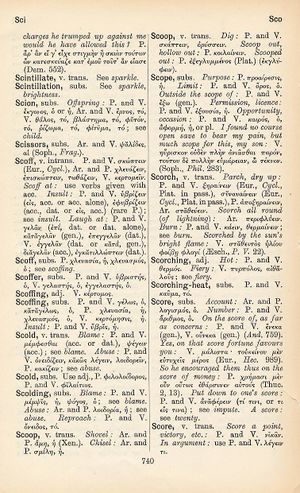score
Ὥσπερ αὐτοῦ τοῦ ἡλίου μὴ ὄντος καυστικοῦ, ἀλλ' οὔσης ζωτικῆς καὶ ζωοποιοῦ θέρμης ἐν αὐτῷ καὶ ἀπλήκτου, ὁ ἀὴρ παθητικῶς δέχεται τὸ ἀπ' αὐτοῦ ϕῶς καὶ καυστικῶς· οὕτως οὖν ἁρμονίας οὔσης ἐν αὐτοῖς τινὸς καὶ ἑτέρου εἴδους ϕωνῆς ἡμεῖς παθητικῶς ἀκούομεν → Just as although the Sun itself does not cause burning but has a heat in it that is life-giving, life-engendering, and mild, the air receives light from it by being affected and burned, so also although there is a certain harmony and a different kind of voice in them, we hear it by being affected.
English > Greek (Woodhouse)
subs.
Account: Ar. and P. λογισμός, ὁ.
Number: P. and V. ἄριθμος, ὁ.
On the score of, as far as concerns: P. and V. ἕνεκα (gen.), V. οὕνεκα (gen.) (And. 759).
Yes, on that score fortune favours you: V. μάλιστα τοὐκείνου μὲν εὐτυχεῖς μέρος (Eur., Hec. 989).
So he encouraged them thus on the score of money: P. χρήμασι μὲν οὖν οὕτως ἐθάρσυνεν αὐτούς (Thuc. 2, 13).
Put down to one's score: P. and V. ἀναφέρειν (τί τινι, or τι εἴς τινα); impute.
A score: see twenty.
v. trans.
Score a point, victory, etc.: P. and V. νικᾶν.
In argument: use P. and V. λέγειν τι.

